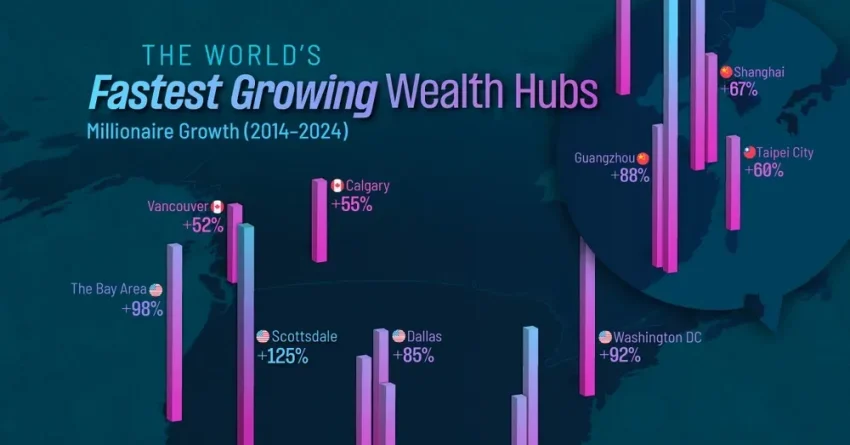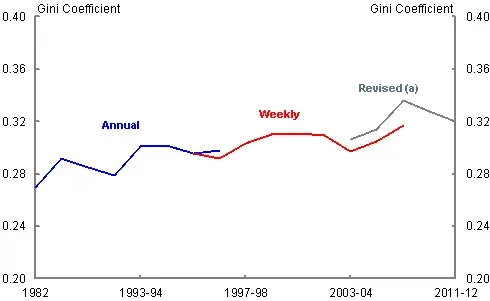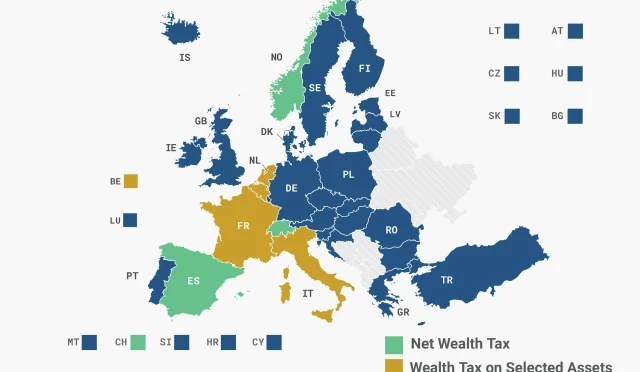Fastest Growing Wealth Hubs: Millionaire Growth Cities 2025
The concept of fastest growing wealth hubs has captured the attention of investors and aspirational entrepreneurs around the globe. In recent years, cities like Shenzhen, Scottsdale, and Bengaluru have emerged as frontrunners in this elite ranking, showcasing significant millionaire growth and reshaping the global city wealth ranking. Shenzhen, often hailed as a technological powerhouse, has seen its millionaire population soar by an impressive 142% from 2014 to 2024, driven by its thriving startup ecosystem and major companies like Huawei. Meanwhile, Scottsdale and Bengaluru continue to attract wealthy individuals with their burgeoning tech sectors and strategic investments in infrastructure. As we explore these wealthy cities, the factors driving their success reveal valuable insights for those looking to capitalize on the emerging market opportunities.
When delving into the realm of financial epicenters, the fastest growing wealth hubs signify areas of remarkable economic expansion and increasing affluence. Cities experiencing significant millionaire growth are not merely geographical locations; they represent thriving environments for innovation, entrepreneurship, and wealth accumulation. For instance, Shenzhen has rapidly transformed itself into a leading technology and investment haven, attracting affluent individuals seeking lucrative endeavors. Similarly, places like Scottsdale and Bengaluru are redefining their identities, evolving from traditional locales into vital centers of wealth creation and opportunity. This shift in city wealth dynamics highlights the importance of understanding which urban landscapes are shaping our financial future.
The Shift of Wealth Towards Shenzhen
Shenzhen has rapidly emerged as the fastest growing wealth hub globally, with an astonishing 142% increase in its millionaire population over the past decade. This city, once a fishing village, has transformed into a bustling metropolis driven by a robust technology sector that includes giants like Huawei and Tencent. The influx of startups and tech companies has further fueled millionaire growth, with employees benefiting from lucrative stock options and initial public offerings (IPOs). As the Chinese government focuses on Shenzhen as a model for innovation, we can expect this growth trajectory to continue, solidifying its status as a leading wealth hub.
The allure of Shenzhen goes beyond its successful companies; it’s also about the supportive ecosystem that fosters financial growth. Government policies encouraging entrepreneurship and investment have created an environment where wealth can flourish. The city’s ability to attract multinational corporations and foreign investments is a testament to its strategic importance in global markets. As regional economic conditions evolve, Shenzhen’s position at the forefront of millionaire growth showcases a remarkable shift in wealth concentration, setting a precedent for other cities worldwide.
Scottsdale: The New Tech Frontier
Scottsdale, Arizona, is cementing its place as one of the fastest growing wealth hubs in the U.S., boasting a remarkable 125% increase in its millionaire population. Shifted from a typical resort town to a vibrant tech hub, Scottsdale is home to GoDaddy’s headquarters and offices for major tech players like PayPal and Yelp. This transformation illustrates how cities can pivot and attract wealth by capitalizing on trends in technology and innovation. Entrepreneurs are drawn to Scottsdale not only for business opportunities but also for its high quality of life, which includes a warm climate and an array of recreational activities.
This growth is indicative of a wider trend where affluent individuals seek out cities with favorable business environments combined with lifestyle benefits. Scottsdale’s burgeoning reputation as a tech haven positions it among the top choices for both startups and established companies, contributing significantly to its rising city wealth ranking. As the city continues to develop its infrastructure and attract talent, we can expect Scottsdale to remain a formidable force in the wealth landscape.
Bengaluru: India’s Silicon Valley
Bengaluru, often referred to as the ‘Silicon Valley of India,’ has solidified its status as a prominent wealth hub with a remarkable 120% increase in its millionaire population. The city thrives on its diverse economy, particularly in IT and biotechnology, leading to a significant increase in wealth accumulation among its residents. Major companies and startups flock to Bengaluru due to its innovative atmosphere and a skilled workforce, ensuring its position as one of the pillars of the Indian economy.
Despite facing competition from other regions, Bengaluru’s unique blend of technology-driven economy and cultural richness continues to attract investments and wealth. Its ability to attract top talent from across India and abroad has resulted in the emergence of numerous millionaire entrepreneurs, reinforcing Bengaluru’s standing among global wealth hubs. As the city navigates challenges and opportunities, the future looks promising, with expectations to sustain its millionaire growth well into the next decade.
Analyzing the Global Wealth Landscape
Across the globe, cities like Shenzhen, Scottsdale, and Bengaluru are redefining the wealth landscape, showcasing the dynamic shifts in millionaire populations. This rise of new wealth hubs is reflective of economic trends where traditional power centers are being challenged by tech-driven innovation and increased entrepreneurial activity. As cities adapt to changes in the global economy, those that embrace technology and provide supportive environments for businesses stand to benefit the most in terms of millionaire growth.
Moreover, the rise of wealth hubs is not just concentrated in a few areas; cities such as Dubai and West Palm Beach are also seeing significant growth in their millionaire populations. This diversification of wealth creation highlights the importance of understanding local economies and their unique attributes that contribute to millionaire growth. As new cities emerge on the wealth radar, the global wealth distribution is expected to change profoundly, necessitating ongoing analysis of millionaire demographics and their implications for city wealth rankings.
The Role of Government Policies in Wealth Creation
Government policies play a crucial role in shaping the environment for wealth growth in emerging hubs. In regions like Shenzhen, supportive legislation encourages innovation and entrepreneurship, allowing new businesses to thrive. By implementing tax incentives, subsidies, and infrastructure investments, governments can propel local economies, attracting wealthy individuals seeking favorable business conditions. The careful crafting of these policies not only aids in building a robust economy but also ensures that wealth distribution becomes more balanced.
On the other hand, cities like Scottsdale have benefitted from pro-business environments that encourage the establishment of tech enterprises. Such policies often include streamlined regulations and reduced bureaucratic hurdles, making it easier for entrepreneurs to launch and grow their businesses. As more local and national governments realize the importance of fostering wealthy ecosystems, we can expect to see targeted initiatives aimed at increasing millionaire populations and enhancing overall economic performance.
Lifestyle Appeal and Wealth Attraction
As cities evolve into wealth hubs, lifestyle factors are becoming increasingly significant in attracting affluent individuals. Cities that offer a blend of high quality living, excellent amenities, and robust business opportunities are finding themselves at the forefront of millionaire migration. The appeal of Scottsdale’s warm climate combined with luxurious dining and entertainment options exemplifies how lifestyle can drive wealth accumulation. Wealthy individuals often seek environments that not only support their business ventures but also offer them a rich living experience.
Furthermore, cities like Bengaluru and Miami have embraced their cultural offerings as a means to attract wealth. Arts, recreation, and entertainment play a pivotal role in creating vibrant communities that appeal to the affluent. As urban centers strive to enhance their lifestyle offerings, it’s evident that the relationship between quality of life and millionaire growth is intertwined. By prioritizing lifestyle enhancements, cities can position themselves as attractive destinations for those looking to build wealth and invest in their future.
Emerging Talent and Educational Opportunities
A vital component of the fastest growing wealth hubs is the availability of educational opportunities and the presence of a talent pool. Cities like Bengaluru and Shenzhen have well-established educational institutions that specialize in technology and entrepreneurship, providing a steady stream of skilled workers to the local economy. These cities attract not just students but also international talent, contributing to a diversified workforce that is essential for startup success and innovation.
The emphasis on education not only fosters individual growth but also enhances the overall economic vitality of these regions. By investing in education and training, cities create a foundation for sustainable wealth growth. Emerging companies in tech and finance benefit immensely from having access to a knowledgeable workforce, setting the stage for increased millionaire populations. As educational opportunities expand, cities will likely enhance their appeal as wealth hubs, attracting more entrepreneurs and investors looking to tap into fresh ideas and skilled labor.
Tech Innovations Driving Wealth Growth
The rapid advancement of technology has become a significant driving force behind wealth accumulation in various cities worldwide. In Shenzhen, tech innovations have led to the creation of multiple unicorns, resulting in a surge of newly minted millionaires. Companies like DJI have not only revolutionized their respective industries but have also shaped the city’s economy by attracting investments and reducing unemployment rates. The tech sector is undeniably a catalyst for economic growth, producing wealth on an unprecedented scale.
As cities invest in technology and innovation, they open doors to entrepreneurship, leading to the establishment of new markets and the expansion of existing ones. Wealth hubs are increasingly recognizing the importance of cultivating tech talents and fostering sustainable innovation ecosystems that can support burgeoning enterprises. This focus not only enhances their local economies but also positions them favorably on the global stage as centers of wealth creation and innovation.
Future Predictions for Wealth Hubs
Looking ahead, the landscape of wealth hubs is likely to continue evolving, with emerging cities steadily challenging traditional powerhouses like the San Francisco Bay Area. As economies diversify and adapt to the shifting priorities of millionaires, we may see a recalibration of the city wealth ranking system. Factors such as climate resilience, infrastructure development, and technological adaptation will increasingly play a crucial role in determining the future leading wealth hubs.
In addition, the rise of remote work and changes in urban living trends may contribute to a shift in millionaire populations towards more desirable locations, such as those offering a high quality of life at a lower cost. It will be essential for policymakers and city planners to remain agile and responsive to these changes to maintain and enhance their attractiveness as wealth hubs. The future of wealth distribution is not only about economics but also about creating livable, sustainable environments that are conducive to growth.
Frequently Asked Questions
What are the fastest growing wealth hubs in the world?
The fastest growing wealth hubs currently are Shenzhen, Scottsdale, and Bengaluru, which have seen significant increases in millionaire populations over the past decade. Shenzhen leads with a 142% increase, followed by Scottsdale with 125% and Bengaluru at 120%. These cities are becoming vital centers for wealth accumulation globally.
How does Shenzhen rank among global wealth hubs?
Shenzhen ranks as the fastest growing wealth hub, boasting a remarkable 142% increase in its millionaire population from 2014 to 2024. This growth is fueled by its thriving tech ecosystem and government support for innovation.
Which city has the highest millionaire growth percentage?
Shenzhen holds the highest millionaire growth percentage at 142%, making it the leading wealth hub globally. The city’s dynamic tech landscape contributes significantly to this surge in wealth.
What factors contribute to Scottsdale’s rise as a wealth hub?
Scottsdale’s rise as a wealth hub can be attributed to its transformation into a tech center, major corporate headquarters like GoDaddy, and an influx of wealthy individuals seeking favorable living conditions, boosting its millionaire growth to 125%.
How does Bengaluru compare to other major wealth hubs?
Bengaluru, known as the ‘Silicon Valley of India’, has experienced a millionaire growth rate of 120%, making it one of the top wealth hubs. Its strong IT and biotech sectors attract significant investments, contributing to its wealth accumulation.
What is the role of the San Francisco Bay Area in the global wealth ranking?
The San Francisco Bay Area remains a leading global wealth hub, with the largest total number of millionaires, totaling over 342,400. Despite a lower growth percentage of 98%, its established tech industry continues to generate immense wealth.
What other cities are recognized as fast-growing wealth hubs?
Besides Shenzhen, Scottsdale, and Bengaluru, cities like Dubai, West Palm Beach, and Hangzhou are also recognized as fast-growing wealth hubs, thanks to their favorable business environments and robust economic sectors.
How does millionaire growth vary across different countries?
The distribution of millionaire growth varies by country, with the U.S. leading with eight wealth hubs, while China follows with five and India features three. This global spread highlights diverse opportunities for wealth accumulation.
Why is Dubai considered a fast-growing wealth hub?
Dubai is considered a fast-growing wealth hub due to its tax incentives, booming real estate market, and a rapidly developing tech sector that attracts wealthy entrepreneurs and investors from around the globe.
What trends are influencing the growth of wealth hubs globally?
Global trends such as technological advancements, urbanization, favorable government policies, and thriving entrepreneurial ecosystems are significantly influencing the growth of wealth hubs, leading to increased millionaire populations.
| City/Area | Millionaire Growth % |
|---|---|
| Shenzhen (China) | 142% |
| Scottsdale (USA) | 125% |
| Bengaluru (India) | 120% |
| West Palm Beach (USA) | 112% |
| Hangzhou (China) | 108% |
| Dubai (UAE) | 102% |
| The Bay Area (USA) | 98% |
| Miami (USA) | 94% |
| Washington DC (USA) | 92% |
| Austin (USA) | 90% |
| Guangzhou (China) | 88% |
| Dallas (USA) | 85% |
| Warsaw (Poland) | 83% |
| Delhi (India) | 82% |
Summary
The fastest growing wealth hubs globally highlight the shifting dynamics of economic power, with Shenzhen leading the charge. Over the years, cities like Scottsdale and Bengaluru have emerged as new centers of affluence, showcasing significant growth in millionaire populations. These hubs are thriving due to factors such as innovation, technology sectors, and favorable economic environments. As the landscape evolves, understanding these growth patterns will be crucial for investors and entrepreneurs seeking opportunities in these burgeoning markets.
#WealthHubs2025 #MillionaireCities #GlobalEconomy #WealthGrowth #EconomicTrends








